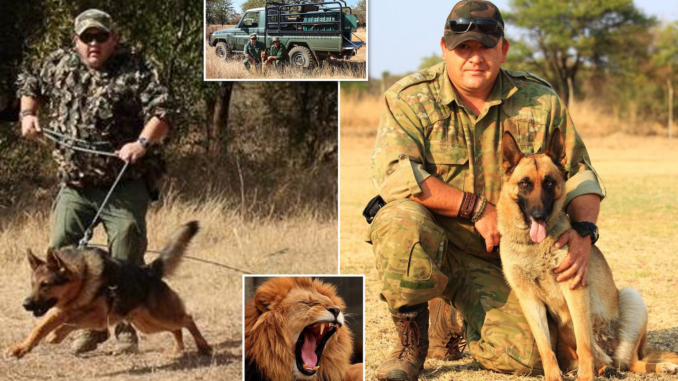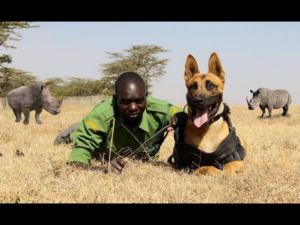
In the fight to protect Africa’s endangered wildlife, a unique and powerful ally has emerged: specially trained anti-poaching dogs. These four-legged heroes are playing an increasingly vital role in detecting poachers, preventing illegal wildlife trade, and safeguarding species like elephants, rhinos, and lions from the brink of extinction. But here’s the twist—these highly skilled dogs are not being trained in Africa. Instead, they are being trained in the lush valleys of Wales, United Kingdom.
The partnership between Welsh dog trainers and African conservationists is helping to combat one of the most urgent threats to biodiversity—poaching. These dogs, whose training prepares them for high-stakes operations in Africa’s most challenging environments, are proving to be instrumental in the ongoing battle to save wildlife.
In this article, we explore how these specially trained dogs are making a significant difference in wildlife conservation and why Wales has become the training ground of choice for this life-saving mission.
Why Anti-Poaching Dogs Are Crucial in the Fight Against Wildlife Crime
Poaching, driven by the demand for illegal wildlife products like ivory, rhino horn, and bushmeat, remains a significant threat to many of Africa’s iconic species. According to recent statistics, elephant and rhino populations in certain parts of Africa have plummeted by over 50% in the past few decades, primarily due to poaching.
In response, anti-poaching efforts have become more sophisticated, involving high-tech equipment like drones, cameras, and even tracking systems. However, one of the most effective methods of tracking and apprehending poachers has been through the use of specially trained dogs.
How Dogs Help in the War on Poaching
Dogs have an extraordinary sense of smell—up to 100,000 times more powerful than that of humans. This allows them to track scents and detect items that would be nearly impossible for humans to find, even with advanced technology. When trained properly, anti-poaching dogs can:
- Detect Poachers and Weapons: Dogs can sniff out weapons, ammunition, and even the scent of human poachers themselves. Their ability to track down criminals over long distances in dense forests or savannahs makes them invaluable on the front lines of wildlife protection.
- Locate Stolen Animal Products: Dogs are also used to track illegal wildlife products like ivory or rhino horn. This helps to dismantle poaching syndicates and reduce the market for illegal wildlife trade.
- Aid in Search and Rescue Operations: In addition to tracking poachers, some trained dogs assist in locating injured or trapped wildlife, further enhancing the overall safety of ecosystems.
Wales: The Unexpected Training Ground for Anti-Poaching Dogs
You might be wondering: why Wales? What makes this part of the world the ideal location for training anti-poaching dogs bound for Africa?
The answer lies in a combination of factors that make Wales an optimal environment for training highly skilled working dogs. While the terrain may not directly mimic the African savannah or jungle, the training methods and expertise available in Wales are exceptional.
1. Expert Trainers with Global Experience
Wales is home to some of the best dog trainers in the world, many of whom have experience working with law enforcement, military, and wildlife conservation organizations. One such organization is Save the Rhino International, which partners with K9 Conservation in Wales to train dogs for deployment in Africa.
These trainers bring a wealth of experience and knowledge, which is crucial for teaching dogs how to handle the unique challenges of anti-poaching operations. They work closely with local African rangers to ensure that the dogs’ training is as effective as possible, providing customized solutions for the specific needs of wildlife protection in various African regions.
2. Controlled Training Environments
Wales offers a safe, controlled, and distraction-free environment for the initial stages of training. The conditions allow trainers to fine-tune the dogs’ skills in tracking, scent detection, and agility before they are deployed to the field.
Additionally, Wales has diverse terrain that mimics some of the landscapes the dogs will face in Africa, such as dense forests, open fields, and rocky areas. This enables trainers to simulate a range of real-world scenarios and teach the dogs how to adapt to different environments.
3. A Partnership Approach
The collaboration between Welsh trainers and African wildlife rangers creates a unique knowledge exchange. African rangers who will be working directly with the dogs in the field travel to Wales to learn how to work with their new canine partners. They receive hands-on training in how to manage and deploy the dogs in the field, which is essential for making the operation as efficient as possible.

Training the Dogs: A Rigorous and Life-Saving Process
Training an anti-poaching dog is no simple task. It requires patience, skill, and the ability to understand a dog’s behavior. The process generally unfolds in multiple stages:
1. Selection of Dogs
The first step is to select the right dogs. Not all dogs are suitable for this kind of work. The best candidates tend to be breeds with high energy, a strong work ethic, and an innate drive to work with humans. Popular breeds used for anti-poaching work include Belgian Malinois, German Shepherds, and Dutch Shepherds.
2. Basic Obedience and Agility Training
Before dogs can be trained for specific poaching tasks, they need to be well-versed in basic obedience and agility. This ensures they can follow commands in high-pressure environments and navigate tricky terrains.
3. Scent Detection
The dogs are then taught to detect various scents, such as human scent or specific animal products like ivory or rhino horn. Scent training is crucial, as poachers often try to disguise their activities by hiding their products or weapons. With their powerful noses, the dogs can help find hidden objects even in challenging environments.
4. Tracking and Pursuit
Once the dogs have mastered scent detection, they learn how to track moving poachers over long distances. This involves a lot of patience and practice, as the dogs must be able to focus despite the distractions of the wild.
5. Real-World Simulations
After dogs have received basic training, they undergo real-world simulations where they work alongside rangers to track poachers in environments that closely resemble the African wilderness. These scenarios often include obstacles like dense underbrush, rivers, and open fields, allowing the dogs to hone their skills in tracking poachers in different conditions.
The Impact of Anti-Poaching Dogs in Africa
Once the dogs are fully trained and deployed to Africa, they play an essential role in anti-poaching efforts. The presence of these highly trained dogs often serves as a deterrent to would-be poachers, who are aware of the enhanced risk of being caught.
Moreover, the dogs help rangers locate poachers much more efficiently, improving response times and increasing the chances of apprehending criminals before they can harm wildlife. This makes it possible to protect more animals and restore balance to ecosystems that are struggling under the pressure of illegal poaching.
Several success stories already illustrate the positive impact of these dogs. For example, in Kenya, anti-poaching dogs have helped reduce the number of rhinos poached by 70% in certain protected areas. In Zimbabwe, dogs have assisted rangers in finding and apprehending poachers who would have otherwise slipped through the cracks.
Conclusion: The Power of Dogs in the Fight to Save Africa’s Wildlife
The use of anti-poaching dogs trained in Wales represents a breakthrough in wildlife conservation. These dogs are more than just highly skilled trackers—they are vital partners in the fight to save Africa’s most vulnerable species. By combining the expertise of Welsh trainers with the dedication of African rangers, this collaboration is proving to be a game-changer in the war against poaching.
As poaching continues to threaten wildlife populations across Africa, the role of these brave canine heroes will only grow more crucial. With their keen noses, boundless energy, and unwavering commitment, these dogs are helping ensure that the future of Africa’s wildlife remains bright.
FAQs
- Why are anti-poaching dogs trained in Wales?
Wales offers a safe, controlled environment for the initial stages of training, with expert trainers and diverse terrain that simulates conditions in Africa. - What types of dogs are used in anti-poaching efforts?
Breeds like Belgian Malinois, German Shepherds, and Dutch Shepherds are commonly used due to their high energy levels, intelligence, and strong work ethic. - How do anti-poaching dogs help save wildlife?
Anti-poaching dogs can track poachers, detect weapons and animal products, and assist in search-and-rescue missions, significantly improving the chances of catching poachers before they harm wildlife. - What is the impact of these dogs on poaching rates?
Anti-poaching dogs have led to a substantial reduction in poaching rates in certain areas, including a 70% decrease in rhino poaching in some parts of Kenya. -
Can these dogs be used in other countries?
Yes, while the dogs are currently being trained for use in Africa, the techniques and skills they learn can be adapted for anti-poaching efforts in other regions, helping protect wildlife globally.
